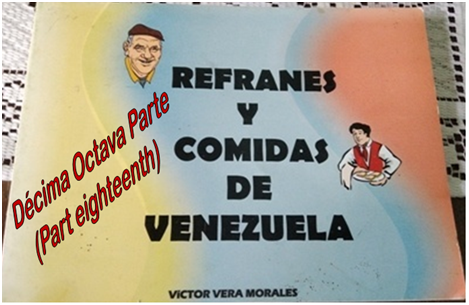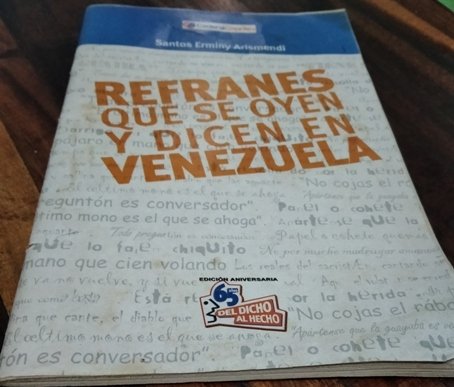

Este es un dicho de carácter universal según el cual, al estar satisfechas las necesidades básicas, como es la alimentación, lo demás no implica preocupación alguna, o al menos cobran menos importancia.
Los “cachachás” es una palabra muy utilizada en Venezuela, que al igual que “corotos” sirve para referirse a las pertenencias de una persona, a su equipaje; entonces, cuando uno de le dice a alguien más “Coja sus cachachás” es una forma despectiva de largar a una persona, de alejarla.
Las ranas son reptiles, los cuales debido a su particular anatomía, nunca presentarán o tendrán pilosidades, pelos o cabellos, sólo escamas o piel; así que cuando se dice que algo ocurrirá cuando la rana eche pelos, esto quiere decir que jamás va a pasar.
Se emplea este refrán para indicar que aquella persona que hace las cosas con desgano y flojera, generalmente le quedan mal hechas, razón por la cual tendrá que repetirlas. Así que mejor dejar la flojera a un lado y hacer las cosas bien la primera vez, para no tener que hacer doble esfuerzo.
Para comprender este refrán hay que explicar primero la imagen o situación que describe. Cuando se dice el que no llora no mama, hace referencia a los bebés recién nacidos, que si no lloran no serán alimentados aún cuando se encuentren entre un monto de mujeres que recientemente hayan parido (“parías”). Ahora bien, al llevar este refrán a la vida diaria, quiere decir, que aquel que calla y no manifiesta su deseo o necesidad, jamás conseguirá solventarla, porque no la está haciendo visible.



This is a universal saying according to which, when basic needs are satisfied, such as food, the rest does not imply any concern, or at least they take on less importance.
The "cachachás" is a word widely used in Venezuela, which like "corotos" serves to refer to a person's belongings, their luggage; so, when one says to someone else "Take your cachachás" it is a derogatory way of throwing a person away, of driving them away.
Frogs are reptiles that, due to their particular anatomy, will never present or have hair, only scales or skin; so when it is said that something will happen when the frog is born hair, this means that it will never happen.
This saying is used to indicate that a person who does things with reluctance and laziness, generally they are badly done, which is why they will have to repeat them. So better to put laziness aside and do things right the first time, so as not to have to make double effort.
To understand this saying, I must first explain the image or situation it describes. When it is said that he who does not cry does not breastfeed, it refers to newborns, who if they do not cry will not be fed even when they are among several women who have recently given birth ("parías"). Now, by bringing this saying to everyday life, it means that whoever is silent and does not express their desire or need will never be able to solve it, because they are not making it visible.
.png)
Dear readers, below I place the links of the first seventeen posts, in case you want to read them:
Víctor Vera Morales. (Agosto 2004). Refranes y Comidas de Venezuela. Editado por el Instituto Municipal de Publicaciones de la Alcaldía de Caracas.
Santos Erminy Arismendi. (2006). Refranes que se oyen y dicen en Venezuela. Cadena Capriles, Caracas. Venezuela.
- Fotos de mi autoría, tomada con un teléfono REDMI 8A, intervenida con WordArt / Photos of my authorship, taken with a REDMI 8A telephone, intervened with WordArt.
- Los diseños incluidos en esta publicación, han sido elaborados por mi persona con la aplicación CANVA / The designs included in this publication has been made by me with the CANVA application.
In the event that it is required to use the content or images of this post and my other publications, I would be grateful if my authorship (Fabiola Martínez) was made and the corresponding link was cited. Thank you.


I love this series of posts! Muchas gracias, me gusta mucho!
¡Gracias @pregosauce! Y a mí me encanta que te guste mucho mi post, y esta serie también. Un saludo.
Excellent teachings - thank you for sharing.
Your content has been voted as a part of Encouragement program. Keep up the good work!
Use Ecency daily to boost your growth on platform!
Support Ecency
Vote for Proposal
Delegate HP and earn more